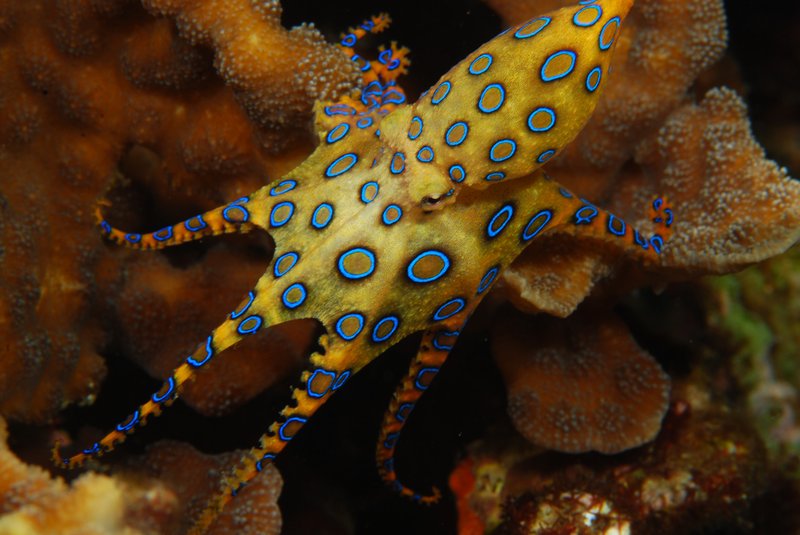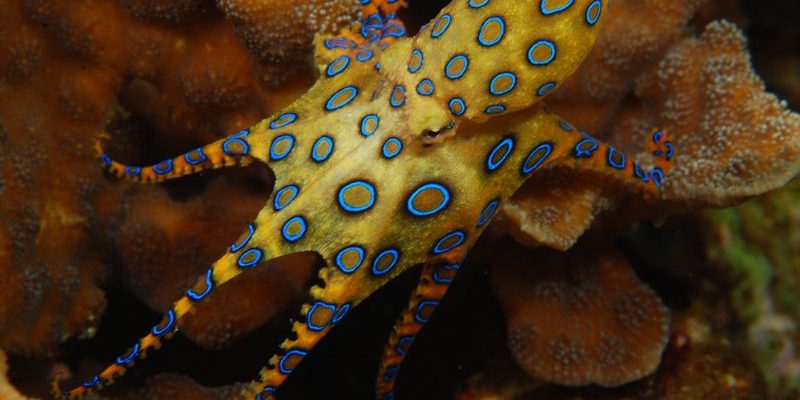
While these octopuses are infamous for their venom, their importance in the ecosystem goes far beyond their fearsome reputation. They serve various roles, from controlling prey populations to providing stability in their habitats. So, let’s dive deeper into the blue-ringed octopus’s life and uncover the secrets of its contribution to the vibrant tapestry of marine life.
What Is a Blue-Ringed Octopus?
Blue-ringed octopuses belong to the genus *Hapalochlaena*, and they primarily inhabit the shallow waters of the Pacific and Indian Oceans. They have eight arms lined with suckers and are known for their striking blue rings, which they display when threatened. These tiny octopuses are not just beautiful; they are also exceptionally fascinating.
With their small size—typically about 4 to 5 inches—they might not seem important in the grand scheme of things. However, their unique adaptations, like the ability to change color and texture, help them survive in their environment. It’s like having a high-tech camouflage system! You might be wondering how something so small can make waves in the ocean’s ecosystem. Let’s unpack that.
The Role of Blue-Ringed Octopuses in the Food Chain
Blue-ringed octopuses are predators, feasting mostly on crabs, shrimp, and other small marine creatures. Their hunting strategy is both stealthy and efficient. They use their camouflage to blend into their surroundings, making them expert ambush predators. With a quick bite, they inject venom into their prey, paralyzing it almost instantly.
This predatory behavior helps regulate the populations of their prey. When these octopuses keep certain species in check, they help maintain a balance within the marine ecosystem. If the numbers of crabs or shrimp swell, it could lead to overgrazing of seagrass beds and corals, disrupting the entire food web. So, you see, the blue-ringed octopus’s role is vital—it’s a piece of the larger puzzle that keeps life flourishing underwater.
Defending the Ecosystem: Venom and Its Impact
Now, let’s talk about the infamous venom of the blue-ringed octopus. It’s one of the most potent venoms in the animal kingdom, capable of causing paralysis in humans. Using it wisely is part of their survival strategy. They only produce venom when necessary, primarily for defense against larger predators like sharks and moray eels.
By possessing such powerful venom, blue-ringed octopuses serve as a natural control method for overzealous predators. When predators realize that they can’t easily feast on blue-ringed octopuses, they may think twice about their hunting grounds. This dynamic creates a balanced ecosystem where various species can thrive without being over-predated.
The Blue-Ringed Octopus and Coral Reefs
Coral reefs are often referred to as the “rainforests of the sea,” and blue-ringed octopuses contribute to these vibrant ecosystems. Found in rocky crevices and among coral formations, they provide an interesting contrast to the colorful corals and fish. Their presence indicates a healthy reef system; they rely on diverse habitats to find food and shelter.
Moreover, blue-ringed octopuses help maintain the health of coral ecosystems by controlling the populations of their prey. If certain species overpopulate, they can damage the reefs by consuming too much algae or other essential organisms. Therefore, blue-ringed octopuses are not just beautiful tenants of the coral reef but also play a role in its overall well-being.
Challenges Facing Blue-Ringed Octopuses
Despite their adaptability, blue-ringed octopuses face several threats in their natural habitats. Human activity, such as pollution, climate change, and overfishing, can severely impact their populations. For instance, damaged coral reefs due to climate change affect their food sources, making survival more difficult.
Another challenge is habitat destruction. Coastal development often leads to the loss of the rocky shores and tide pools that these octopuses rely on. When you consider that blue-ringed octopuses are already vulnerable due to their limited habitat range, these threats compound their struggles.
Conservation Efforts and What You Can Do
Conservation is essential for protecting blue-ringed octopuses and their habitats. Efforts include establishing marine protected areas (MPAs) where human activity is limited, allowing the ecosystems to thrive. Education and awareness campaigns can also play a crucial role in protecting these creatures. When people understand the importance of blue-ringed octopuses, they may be more inclined to support conservation efforts.
So, what can you do? You can start by advocating for policies that protect marine environments. Reducing plastic use and participating in clean-up efforts can also make a difference. Every little bit helps, and when it comes to preserving marine life, every action counts.
The Intriguing Future of Blue-Ringed Octopuses
As we move forward, the future of blue-ringed octopuses hangs in the balance. Their beauty and unique abilities capture our hearts, but their survival relies on our actions. By taking steps to protect the oceans, we ensure that these fascinating creatures continue to thrive.
Understanding the role of blue-ringed octopuses helps us appreciate the complexity and interconnectedness of marine ecosystems. As we learn more about these small creatures, we uncover important insights that can guide conservation efforts and inspire future generations to care for the seas.
In conclusion, the blue-ringed octopus is a dazzling gem of the ocean, contributing to marine ecosystems in ways we are only beginning to understand. By protecting their habitats and respecting their roles within the ocean, we can help ensure that the beauty of the blue-ringed octopus will continue to captivate and educate those who venture into the underwater world.

